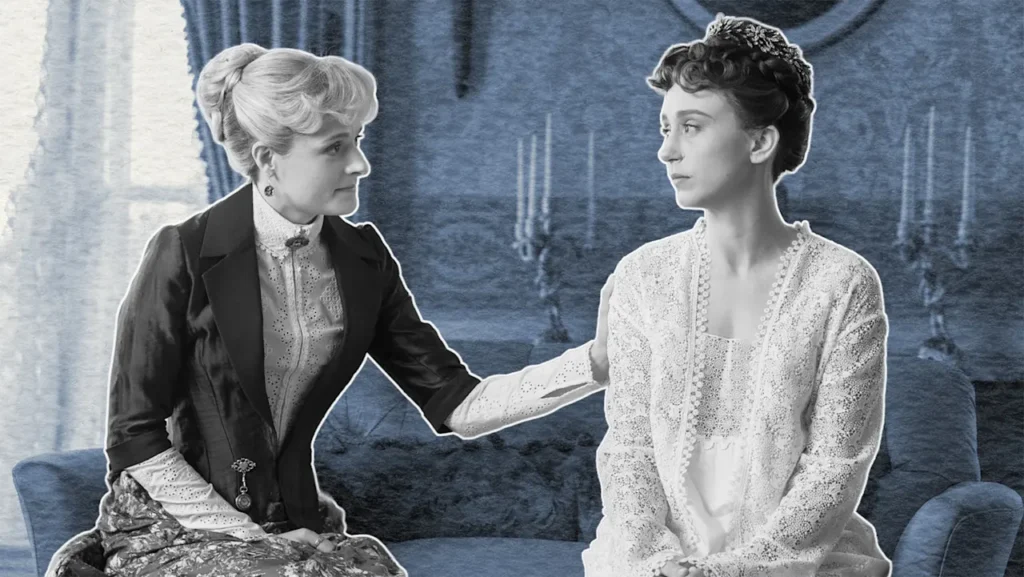
Historical period dramas are not only highly entertaining but also can serve as bigger metaphors for modern audiences. Wrapped up in the elaborate costumes and stylized language, there are lessons to be learned.
So it is with Julian Fellowes’s HBO series The Gilded Age, which has much to say about the complexities of innovation and capitalism. The series has been scoring record ratings ahead of its much-anticipated Season 3 finale, which airs August 10.
Let’s take a look at what all the fuss is about. If you’re not up to date on the series, beware: There are spoilers ahead!
First, some background
Before we get into the dollars and cents of it all, here’s a quick refresher. The Gilded Age premiered in January 2022 on HBO despite being slated to air on NBC originally.
The plot follows Marian Brook (played by Louisa Jacobson), a newly orphaned young adult who is forced to move in with her old-monied aunts in New York City in 1882.
Residing across the street from her new home are railroad magnate George Russell (Morgan Spector); his wife, Bertha (Carrie Coon); and their two young adult children, Larry (Harry Richardson) and Gladys (Taissa Farmiga), who are looked down upon because of their “new money” status.
The title of the show refers to the time period in which it is set. Mark Twain and Charles Dudley Warner are credited for naming this moment in history in their book The Gilded Age: A Tale of Today. These authors’ social commentary remarked that the period looked beautiful but it was all just a patina or facade built on an ethically questionable foundation. So what can audiences learn here?
Capitalism needs regulation
While George Russell is a fictional character, he has historical precedent in the likes of Jay Gould and Cornelius Vanderbilt.
George made his fortune by being a ruthless railroad tycoon. When the old guard doesn’t accept his authority, he muscles his way in. In Season 1 he manipulates the stock market, causing Patrick Morris (Michael Gill), a city alderman, to lose his fortune and take his own life.
George isn’t afraid to pressure politicians to achieve his goals of railroad expansion. He threatens to pull his business from the representatives’ districts, and offers bribes and political favors. He bullies entire towns by promising to bypass certain cities if his demands are not met. George does not care about the human impact of his business dealings.
Audiences are shown a softer side of the robber baron in Season 2 when he agrees to negotiate with striking railroad workers, but even then George makes sure the final deal favors his interests instead of the working class.
Ultimately, the character serves as a cautionary tale, warning against unchecked capitalism (though last week’s cliffhanger suggests we may see him have a change of heart).
It’s lonely at the top
Jack Trotter (Ben Ahlers) works as a footman in the Van Rhijn household. On the side, he labors to invent a reliable alarm clock and ultimately sells it with Larry Russell for $600,000.
Overnight, Jack’s whole life changes. His take is worth around $9.5 million in today’s dollars, according to Vulture.
While this achievement gives Jack options, he is forced to leave the only home he’s ever known. He is now a man who doesn’t fit in anywhere, straddling the world of aristocracy and his former working-class roots. It’s interesting to ponder whether or not money bought Jack happiness.
Money opens doors
Bertha Russell is an ambitious woman who spends much of the series determined to win the approval of society’s most elite circles. Her wealth gets her in the door, but it does not buy her immediate acceptance.
Bertha is snubbed by the Van Rhijns and Mrs. Astor (Donna Murphy), denied a box at the opera, and gossiped about relentlessly. Eventually, she makes her own mark in society—because all money talks, even if it’s new.
There will be ups and downs
Capitalism is volatile, as experienced by many of the characters in The Gilded Age. This includes Oscar van Rhijn (Blake Ritson), who was born to privilege but loses it all with one bad real estate investment. Thankfully, his Aunt Agnes (Christine Baranski) reluctantly saves the day.
Ditto for Mr. Collyer (Michael Cerveris), who was once a successful banker. When he loses his money, his father-in-law gets him to agree to divorce his wife and abandon his child. He changes his name to Watson and finds employment in the Russell household as a valet.
The Russell family fortune is dependent on the railroad industry. Because this is new technology in the 19th century, it can be a highly speculative enterprise. When profits are king, entrepreneurs like George Russell run the constant risk of becoming over-leveraged, having to defend their wealth in morally questionable ways, and maybe even losing it all.
The latest season of The Gilded Age focuses in part on the real-life panic of 1893, which “threatened the solvency of the entire banking system,” according to Federal Reserve History.
New industries change society
The railroad was a disrupting force in 19th-century America, analogous to the modern tech industry. Trains not only changed how people traveled but also how products were distributed and wealth was made.
These days, Silicon Valley tech entrepreneurs like Mark Zuckerberg and Jeff Bezos fundamentally shift society with entities such as Facebook, Instagram, and Amazon. Like the Russell family, they also have amassed enormous wealth, and they exert their power across business, culture, politics, and philanthropy.
If George Russell were alive today, he might be ushering in the latest version of ChatGPT instead of building a new rail line. Oscar van Rhijn might have lost his fortune on crypto or NFTs.
While the final word might lie in future episodes, The Gilded Age doesn’t fully condemn or endorse capitalism. It holds a mirror up to human nature and lets the audience draw its own conclusions, via petticoats and top hats.


